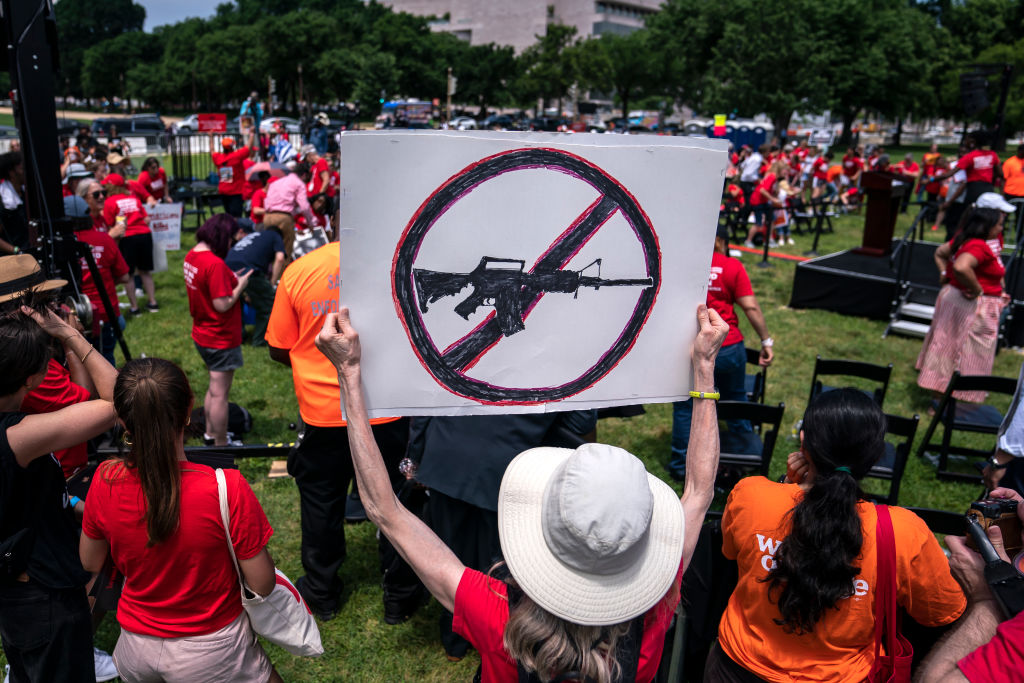
A judge’s recent block of an assault-weapons ban in a Colorado county could be an early sign of a trend for local municipalities with similar laws.
On Tuesday, U.S. District Judge Charlotte Sweeney granted a temporary restraining order (TRO) against Boulder County’s enforcement of a ban on assault weapons after a lawsuit was filed by the Rocky Mountain Gun Owners, a gun-rights advocacy group in Colorado. The ban, adopted on August 2 by the Board of County Commissioners of Boulder County, included the manufacturing and sale of AR-15 rifles.
Adam Winker, a constitutional-law professor and gun-policy expert at UCLA, says this ruling is significant because “the constitutionality of assault-weapons bans is likely to be one of the next battlefields in the Second Amendment.” Referring to a recent Supreme Court case that expanded gun rights in New York, he explained that it “didn’t say anything explicit about assault-weapons bans. But the court did adopt a new test that will make it harder for assault-weapons bans to survive judicial scrutiny.”
Read more: When There’s Talk of Gun Control, Gunmakers Play the Jobs Card. They’re Often Bluffing
While these cases on the surface may not be about the same things (the New York case was about handguns and self-defense and the Colorado one is about assault weapons), experts say that the Supreme Court ruling could impact other gun rulings as well.
“The court said that gun laws must be consistent with the gun laws of the 1800s. So given the historical context, it seems very possible that courts will strike down assault-weapons bans,” Winkler says, though he also points out that the courts have historically been split on assault-weapon bans.
In her ruling, Judge Sweeney cited the Supreme Court decision as a reason for the pause. “The Supreme Court has recently ruled that individuals have a constitutional right to carry a handgun for self-defense outside the home and New York’s licensing regime for public-carry licenses impermissibly interfered with that right,” the judge explained in her decision. “On this admittedly limited record and with a liberal analysis of this factor, the Court finds that Plaintiffs establish a substantial likelihood of success on the merits.”
This was the second time in the last couple of months that a judge banned a Colorado city from enforcing an assault-weapons ban. In July a judge in Superior, Colo., issued a TRO preventing the town from enforcing certain gun restrictions and also cited the New York case.
“The Supreme Court has basically made clear that it wants to see courts be more skeptical of gun laws, and do more to protect the Second Amendment,” Winkler says.
In response to the ruling in Boulder County, the city of Boulder said that this temporary ban will allow “more legal coordination among neighboring jurisdictions.” “This decision in no way demonstrates a lack of resolve by Boulder’s City Council or administration. We believe these bans are both necessary and legal,” city attorney Teresa Taylor Tate said in a statement.
In June, Boulder City Council passed six gun-control laws meant to reduce gun violence. This included banning assault weapons and large-capacity magazines and increasing the age when someone could buy a gun from 18 to 21. These measures, too, have been challenged by the Rocky Mountain Gun Owners, which has filed five lawsuits in Colorado over gun regulations.
‘ANOTHER ONE DOWN,” Rocky Mountain Gun Owners tweeted about the Boulder County decision.
The pause from the judge is set to last 14 days while court proceedings around the lawsuit continue.
The last federal assault weapons ban was in place from 1994 to 2004 and has never been successfully renewed. Today there are only seven states—New York, New Jersey, Maryland, Hawaii, Massachusetts, Connecticut and California–plus the District of Columbia that have laws banning assault weapons. Minnesota and Virginia both regulate but do not ban assault weapons.
Read more: The Inside History of How Guns Are Marketed and Sold in America
Some critics have questioned the effectiveness of assault-weapons bans. During a Fourth of July parade in Highland Park, Ill., this summer, a gunman carried out a mass shooting, killing seven people and injuring dozens of others. Highland Park has had an assault-weapons ban since 2013.
“It’s hard to know exactly how effective assault-weapons bans are. The laws are pretty easy to skirt,” Winkler says, adding that people can just buy a gun in another state, remove certain military characteristics by taking away the bayonet lug or a folding buttstock, or use a ghost gun so that it’s not violating whatever rules of the ban are in place.
Still, some gun-policy experts see a benefit in these bans at both the local and national levels. Louis Klarevas, author of Rampage Nation: Securing America From Mass Shootings, researched the 10-year period of the assault-weapons ban and found that there was a significant reduction in mass shootings.
During a speech in Wilkes-Barre, Penn., on Tuesday, President Joe Biden expressed his goal of bringing back a federal ban on assault weapons. “I did it once before and I’ll do it again,” he said.
More Must-Reads from TIME
- Cybersecurity Experts Are Sounding the Alarm on DOGE
- Meet the 2025 Women of the Year
- The Harsh Truth About Disability Inclusion
- Why Do More Young Adults Have Cancer?
- Colman Domingo Leads With Radical Love
- How to Get Better at Doing Things Alone
- Michelle Zauner Stares Down the Darkness
Write to Josiah Bates at josiah.bates@time.com